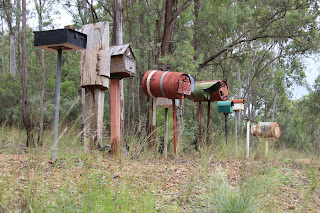We end up late having to overnight in Singleton. Several times in the last couple of decades we have landed at Singleton at the end of a day. Always there has been an accommodation shortage but anything you get seems to be better than nothing in the ensuing panic for a bed at such times.
Tonight is no different. We are allowed an unmarked camping spot near the back of the kitchen where our electricity cable has to snake through a chink in a window to find a power niche. Barely a campsite. And certainly any inspector would not at all be impressed. But every spot in the place is packed. There is nowhere else to put a thing.
All around us are cabins, statics and makeshift homes chocked with coal miners who live here. Who pay in the vicinity of $300 a week to rent even the meanest shed. There are over 4000 coal miners working in the 18 coal mines that char the Singleton landscape. It seems they all live in this caravan park. I hate these cramped conditions, the meanness of the places these folk have to live just to follow the work. But there is no other accommodation for them: no other option.
At the base of one of the laundry posts where we bang in a tent peg there is a basil plant and a fresh green spinach shooting up from this tired hot soil. Such a symbol of hope. I ask who planted it.
One of the younger coal miners has a partner living with him in one of these dreadful dongas. This is the only way they can begin their lives together. She plants basil and spinach and watches them grow as she waits for him to come home each night. I smell basil as I drift off to sleep -- and end up sleeping like a log. But if I never visit Singleton again in my life I will not be sad.
We all loved the characterful mailboxes along the Putty route.
South to Sydney where we head to the genealogy records office at Kingswood where I check out some family records that had been to the conservator. So easy to access. You would barely know that Australia's largest city is just a highway east of here which, in seconds, becomes manic busy.
We do our research then scoot south and east back to the coast, where maybe the rains have stopped, and we find they have. But, enroute, we are stunned by the ugliness of these western and southern Sydney suburbs.
As for the miners in the shacks at Singleton, we again feel sympathy. Who would actually choose to live here? It is all so scruffy, sad and seriously ugly. I want to get in and mow and tidy the shaggy yards, fields and byways.
Tho' it seems a bigger broom wants to move into this space. Sydney needs an overflow airport and Badgery's Creek is the mooted site. Albeit right next to Sydney's fresh water supply. Why am I not surprised at this thinking?
We overnight at Kiama and are soothed by the splashing of waves, then neat appearance of the gracious historic buildings, the normalcy of now. We want to eat at Hanoi on Manning which is Asian with a deliciously different menu, but it is closed. Sigh. Next time.
A little sign directs us to take a right into the hills next morning, bringing us to Molly Allen's shop: Molly's Place, in Tilba Village. This is an old hill village, south of Sydney Town, that appears to be breathing again, at least during the summer when tourists are about, thanks to the National Trust, who have hired folk to fill the wee houses in this old town, keeping the village alive.
Molly Allen, it turns out, lived in one of these cottages, at the turn of the century. On her wooden stove, every summer, she single-handedly baked 600 dozen scones, with no insulation to cool her kitchen, to sell in Tilba's Teapot cafe, during the season.
Where have all those amazing numbers of people gone? Long time passing.
Down the street from Molly's place is the old roller skating rink which was later adapted and used as a dance hall, for decades. I hope Molly took time to dance there, because that life is all gone now.
But, before that, and just after the war when the ABC Cheese factory was being rebuilt, big wheels of cheese were stored in this hall, and some say to this day that it was the leaking butter fat from these cheeses that enabled Fred to spin Ginger better on this dance floor than on any other along the entire south coast of New South Wales.
Loved Tilba. Thank you, National Trust. Unlike many of the most beautiful villages we visit in France each year, some people actually live in this town all year round. The baker does, for instance. I asked. But I couldn't find anything like 'Molly's scones', and you know, I do believe they would be a big draw card.
 |
| Love the iconic Aussie mailboxes |
 |
| Stubbornly, it grows |
 |
| State Records Office, Kingswood |
 |
| Grand hotel, Kiama |
 |
| Tilba Village |
 |
| Tilda's Teapot cafe in historic old Tilba |
No comments:
Post a Comment